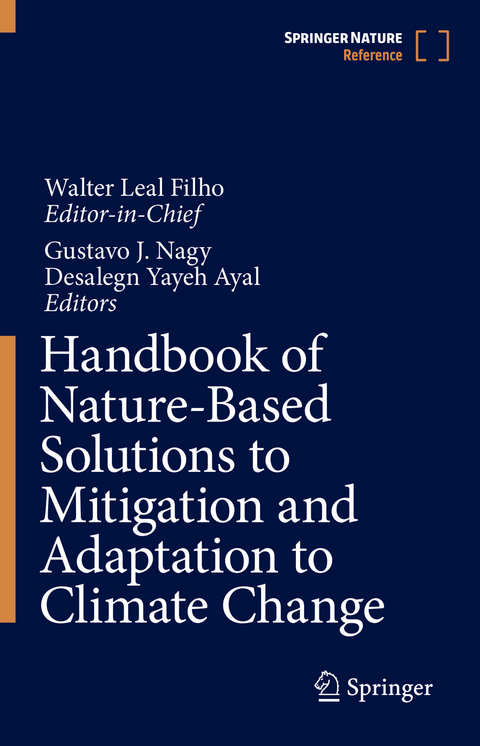
Handbook of Nature-Based Solutions to Mitigation and Adaptation to Climate Change
Springer International Publishing
9783031349669 (ISBN)
Over recent years, nature-based solutions (NbS) have gained popularity as tools to ameliorate the effects of climate change, while slowing down the global warming process. More specifically, the potential of NbS has been explored in terms of meeting greenhouse gas emissions targets, and fostering climate change adaptation.
NbS are methods that use and enhance nature to improve social and environmental challenges. They involve several multifaceted actions, that work sustainably to restore and protect the natural environment while helping people. Therefore, these solutions are useful in climate change adaptation and mitigation. There are 3 main areas which NbS may target, namely reducing exposure, reducing sensitivity, and supporting adaptive capacity.
Reducing exposure refers to protecting areas from existing climate change effects. There is thus a perceived need to document and promote experiences related to NbS, and to apply these in different contexts.
It is against this background that the "Handbook of Nature-Based Solutions to Mitigation and Adaptation to Climate Change" is being produced. The publication will showcase experiences related to NbS from around the world. In particular, it will gather examples of projects, studies and the latest thinking on NbS, which can serve the purpose of inspiring and fostering further works in this key area.
Thanks to its scope and thematic diversity, the book will be of special interest to representatives from government organisations, researchers and students from a wide range of natural and social sciences courses. It will also provide useful information to practitioners and representatives from non-governmental organisations.
Professor Walter Leal Filho (BSc, PhD, DSc, DPhil, DTech, DL, DLitt, FSB, FLS, FRGS) holds the Chairs of Climate Change Management at the Hamburg University of Applied Sciences (Germany), and Environment and Technology at Manchester Metropolitan University (UK). He directs the European School of Sustainability Science and Research (ESSSR) and the Inter-University Sustainable Development Research Programme, the largest network of universities specifically focusing on research on matters related to sustainable development. Professor Walter Leal Filho has over 30 years experience on sustainable development research and in excess of 600 publications to his credit. Gustavo J. Nagy is an Associate Professor of Environmental Sciences (Global Environmental Change) at the Faculty of Sciences, University of the Republic (UdelaR), Montevideo, Uruguay. Gustavo holds a PhD degree in Oceanography (University of Bordeaux I, France). He serves as the Deputy Editor of the International Journal of Climate Change Strategies and Management, Associate Editor of Climate Resilience and Sustainability, and PLOS Climate. Gustavo is a researcher at the National Research System and Basic Sciences Programme (in Geosciences), Uruguay. He has published more than 70 publications, including books, book chapters. He is an IPCC AR6 WG II Lead Author and a chapter co-author of the Iberoamerican Network of Climate Change (RIOCC) Climate Adaptation Report (2020). His principal areas of research interest include climate change vulnerability, climate change adaptation, climate resilience, ecosystem-based adaptation, climate-related disasters, sustainable development and livelihoods, in multiple sectors and systems (e.g. coastal areas, cities and settlements, health and wellbeing). He thoroughly understands the link between natural and human-induced hazards with sustainable development and has experience in climate change impact assessment on livelihood in coastal areas. He has been a national and international consultant (Uruguayan Directorate of the Environment; UN-ECLAC, UK-DFID, UNDP) and research project leader on climate change impacts, adaptation and vulnerability. Dr. Desalegn Yayeh Ayal is an Associate Professor of Disaster Risk Management and Sustainable Development at the Center for Food Security Studies, College of Development Studies, Addis Ababa University. Desalegn holds a PhD degree in Geography. Desalegn serves as the Deputy Editor of International Journal of Climate Change Strategies and Management. He has published more than 40 publications including books, book chapters, and referred journal articles. He is East Africa vice president for Interconnections for Making Africa Great Empowered and Sustainable Initiative. He is a founder and director of Academics Stand Against Poverty (ASAP) Ethiopian Chapter. He has also presented papers on climate adaptation and related issues at many international and national conferences. His principal areas of research interest include climate change vulnerability, climate change adaptation, climate change mitigation and related issues, indigenous weather forecasting, integrated natural resources rehabilitation and management, livelihoods and food security nexus, among others. He thoroughly understands the link between natural and human induced hazards with sustainable development, and works hard to familiarize with current tools of climate change impact assessment on livelihood and the wider environment. He has been actively involved in climate resilience and integrated natural resources rehabilitation and management research, and development interventions to improve food security.
Nitrogen use efficiency: A nature based tool for nitrogen pollution reduction in soil, water and atmosphere.- Edible insect business in tackling poverty and building resilience against changing climate: Rivers State, Nigeria.- Arable Crop Farmers Adapt to Climate Change Risks with Nature-based Solutions in Nigeria.- Government rainwater harvesting program in dryland of northern Ghana.- Health Impacts of Increasing Temperature in Southwestern Nigeria: Informed Mitigation and Adaptation.- Organic Amendments in Traditional and conventional agriculture to mitigation of climate change in developing countries.- Anaerobic Digestion: Climate Change Mitigation through Sustainable Waste Valorization.- Agroecology: Alternative to conventional food systems in Granada Province, Spain.- Adaptation to sea-level rise: assessment of LULC of mangrove region using remote sensing and GIS.- City Resilience to Climate Change in Nepal, Nature based solutions.- Multiple Forest Ecosystem Services: indicator framework to promote nature based solutions.
| Erscheint lt. Verlag | 9.12.2025 |
|---|---|
| Mitarbeit |
Chef-Herausgeber: Walter Leal Filho |
| Zusatzinfo | XLIX, 2801 p. 455 illus., 419 illus. in color. In 3 volumes, not available separately. |
| Verlagsort | Cham |
| Sprache | englisch |
| Maße | 155 x 235 mm |
| Themenwelt | Sachbuch/Ratgeber ► Natur / Technik ► Natur / Ökologie |
| Naturwissenschaften ► Biologie ► Ökologie / Naturschutz | |
| Naturwissenschaften ► Geowissenschaften ► Geografie / Kartografie | |
| Technik ► Umwelttechnik / Biotechnologie | |
| Schlagworte | climate change adaptation • Climate Change Mitigation • Indigenous and local knowledge • Natural infrastructure • nature-based solutions |
| ISBN-13 | 9783031349669 / 9783031349669 |
| Zustand | Neuware |
| Informationen gemäß Produktsicherheitsverordnung (GPSR) | |
| Haben Sie eine Frage zum Produkt? |
aus dem Bereich


